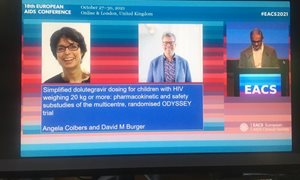31 August 2020
Especially in countries where the number of infections is high and good care is less accessible, this makes it easier to treat children. These results, published today in the scientific journal The Lancet HIV, are included in the treatment guidelines of the World Health Organization (WHO).
It was already known that dolutegravir in combination with other medications is a good treatment for all HIV-infected adults, because the drug effectively inhibits the growth of the virus and the virus does not quickly become resistant. Moreover, it is a safe and inexpensive drug, which is widely available: from high to low income countries, an important starting point for the WHO to put health care in different countries on an equal footing.
David Burger: "This led to problems: these lower doses are not easily available in low and middle income countries, so national programs could not be started up properly and the risk of errors in dosage and intake increased. Moreover, this medication was not appropriate for small children weighing less than 20 kilos. In short, there was a need to achieve a simpler and more practical dosage of dolutegravir for children".
As a result of this study, the World Health Organization WHO has adjusted the guidelines for treatment in HIV-positive children and the FDA has recently approved this dosage.

Especially in countries where the number of infections is high and good care is less accessible, this makes it easier to treat children. These results, published today in the scientific journal The Lancet HIV, are included in the treatment guidelines of the World Health Organization (WHO).
1.7 million children live with HIV
Worldwide, about 1.7 million children are infected with HIV (the human immunodeficiency virus, which can cause the disease AIDS), of which 1.2 million live south of the Sahara. These children need life-long medication to inhibit the virus, so that illness, death and infection of others can be prevented. It is estimated that by 2018 only 56% of HIV-infected children had access to proper medication. In addition, the effect in children and teenagers is less good than in adults.It was already known that dolutegravir in combination with other medications is a good treatment for all HIV-infected adults, because the drug effectively inhibits the growth of the virus and the virus does not quickly become resistant. Moreover, it is a safe and inexpensive drug, which is widely available: from high to low income countries, an important starting point for the WHO to put health care in different countries on an equal footing.
Lack of access to good treatment
It is also known that treatment methods for children often lag behind those for adults. In the case of HIV-inhibiting treatments, children over 12 years of age and 40 kilos of weight received the same dosage of dolutegravir as adults (one tablet of 50 mg daily). But younger children, or those with a lower weight, had to take two or more tablets daily, of a lower amount (10mg and 25mg), a dosage that was not approved by all drug agencies.David Burger: "This led to problems: these lower doses are not easily available in low and middle income countries, so national programs could not be started up properly and the risk of errors in dosage and intake increased. Moreover, this medication was not appropriate for small children weighing less than 20 kilos. In short, there was a need to achieve a simpler and more practical dosage of dolutegravir for children".
Easier dosage leads to good results
The study set up by Burger with colleagues Pauline Bollen and Angela Colbers from the Radboudumc and colleagues from the Medical Research Council Clinical Trials Unit, University College London, focused on simplifying the dose of dolutegravir that children have to take every day, which had to be equally effective and not cause any additional side effects. They did this by giving 62 HIV-positive children between the ages of 6 and 18 from Uganda and Zimbabwe different doses of medication, taking into account their weight. They were followed for almost half a year. This showed that one tablet of dolutegravir of 50 mg daily, the same dosage as adults, works well with the children and that their body reacts to the drug in the same way as the more difficult dosage to give. This benefits the treatment of the children.As a result of this study, the World Health Organization WHO has adjusted the guidelines for treatment in HIV-positive children and the FDA has recently approved this dosage.
Related news items

David Burger top scientist on anti-HIV medication
6 December 2021 Professor of Clinical Pharmacy David Burger, affiliated with the Radboudumc Pharmacy, is in the list of top scientists in the field of anti-HIV medication. go to page
The European Hector Research Award in HIV 2021 awarded to Angela Colbers and David Burger
2 November 2021 On Friday 29 October 2021, during the 18th European AIDS Conference in London, the Hector Research Award for the best scientific article related to clinical or epidemiological HIV research was presented to Angela Colbers and David Burger, both working in the Pharmacy of the RadboudUMC. go to page
Rob Aarnoutse is appointed as professor in Translation pharmacology of antimicrobial agents in particular drugs for tuberculosis
25 January 2021Hospital pharmacist and clinical pharmacologist Rob Aarnoutse is appointed as professor in ‘Translation pharmacology of antimicrobial agents, in particular drugs for tuberculosis’ at Radboud University / Radboudumc, starting 16 November 2020.
go to page
Dolutegravir versus efavirenz in women starting HIV therapy in late pregnancy (DolPHIN-2)
12 May 2020 In Lancet HIV RIHS researchers Angela Colbers and David Burger showed in an open-label, randomized controlled trial, that, when initiated in the 3rd trimester of pregnancy, achievement of VL <50cp/mL at delivery was more likely with dolutegravir-based therapy than with efavirenz-based regimens. go to page
The effect of pregnancy on the pharmacokinetics of dolutegravir in women living with HIV
17 March 2020 In Clinical infectious diseases RIHS researchers Pauline Bollen, Jolien Freriksen, Angela Colbers and David Burger together with researchers of the PANNA network showed that dolutegravir use in pregnancy results in effective plasma concentrations. go to page
